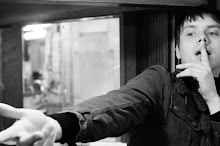Susa
On top of a snowy plateau stands a city. In the middle, white on white, a brand new cathedral. The inside is almost completely bare. The only worshippers, a group of monks saying mass for themselves. Their singing is discordant, just like the sight of the cathedral - unblemished, yet somehow wrong, grating against the surrounding space.
Soviet-era high rises tower around the cathedral and upon the surrounding hills. Most of them are derelict, bombed-out, burnt-out hulks. In some of them people are still trying to somehow make a living - plastic sheets for windows, metal pipes poking through as improptu chimneys for improptu wood-fired stoves. The empty hulks still provide a source of sustenance - a former window frame, a broken door - anything will do as firewood.
A mosque stands down the hill from the cathedral. From the outside it is quite pretty - an old
Persian design. Inside, everything has been stripped bare. It's strangely quiet in the surrounding streets. A few dogs scavange food from piles of rubbish. They shuffle into the shadows when I approach. We come to a shop. Inside, everything seems normal - the usual variety of food and other daily supplies. The people inside are cautious, reserved, but not unfriendly.
Persian design. Inside, everything has been stripped bare. It's strangely quiet in the surrounding streets. A few dogs scavange food from piles of rubbish. They shuffle into the shadows when I approach. We come to a shop. Inside, everything seems normal - the usual variety of food and other daily supplies. The people inside are cautious, reserved, but not unfriendly.
In the central square, a soviet era statue sits on a bench, a contented look on the worker's face. It seems that it's all that remains of the tolerance and coexistance that was once Susa's claim to fame.


0 Comments:
Post a Comment
<< Home